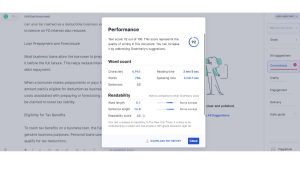The COVID-19 pandemic has accelerated digitization with an increased focus on self-reliance across sectors in India. This has led to a surge in entrepreneurship, with many exploring business opportunities in diverse domains. However, limited access to financing remains a key challenge.
Almost 29% of startups fail in India due to a lack of funding. As per another study, 47% of startup failures in 2022 were due to a lack of uninterrupted working capital.
Business loans can provide the crucial capital that entrepreneurs need to turn their ideas into reality. Beyond facilitating access to credit, business loans also offer beneficial tax deductions that promote growth and development. Let’s explore the key tax benefits applicable to business loans in India.
Tax Deductions on Interest Payments
One of the biggest advantages of taking a business loan is the tax deduction available on interest payments. As per the Income Tax Act, 1961, the interest paid on a business loan is tax deductible under section 36(1)(iii).
This helps reduce the effective interest cost and overall tax outflow for the borrower. The interest can be claimed as a deductible business expenditure against total taxable business income. The sum of deduction that is eligible for claims is not limited.
For example, if your business has a turnover of Rs. 1 crore and you pay Rs. 5 lakhs as interest on a business loan, your net taxable income reduces to Rs. 95 lakhs. So you end up saving tax on Rs. 5 lakhs of your income due to the deduction.
This benefit is applicable to all kinds of business entities, including sole proprietorships, partnership firms, LLPs and private limited companies. The deduction can be claimed on interest paid on term loans as well as working capital loans. Even interest on loans taken for personal purposes but used for business can be claimed.
Processing Fee Deductions
Apart from interest, borrowers also have to pay various processing fees and charges to lenders during a business loan application. This includes documentation charges, prepayment charges, foreclosure charges, loan origination fees, etc.
As per Section 36(1)(va) of the IT Act, the fees and charges paid for availing a business loan are also eligible for tax deduction as business expenditure. So, you can reduce your overall tax outflow by claiming deductions on the processing fees as well.
No Tax Incidence on Principal Amount
A common concern among borrowers is whether the principal loan amount will also be taxed. But there is no tax applicable on the principal business loan amount taken.
The principal is considered capital receipt and not income for the business. So you do not have to pay any income tax on the amount you borrow through a business loan. This makes taking loans a very tax-efficient means of financing business activities.
Tax Benefits on Interest on Fixed Deposits
Many lenders ask for Fixed Deposit receipts as collateral for extending business loans. The interest income earned on such FDs is subject to taxation.
However, if the FD is pledged against a business loan, the interest income can also be claimed as a deductible business expenditure. So the tax incidence on FD interest also reduces.
Loan Prepayment and Foreclosure
Most business loans allow the borrower to prepay the loan and foreclose it before the full tenure. This helps reduce interest outflow and accelerate debt repayment.
When a borrower makes prepayments or pays foreclosure charges, the amount paid is eligible for deduction as business expenditure. So any costs associated with prepaying or foreclosing a business loan can also be claimed to lower tax liability.
Eligibility for Tax Benefits
To claim tax benefits on a business loan, the funds have to be utilised for genuine business purposes. Personal loans used for business do not qualify for tax deductions.
Also, interest has to be paid before claiming deductions – accrued but unpaid interest cannot be claimed. Proper documentation regarding loan sanctions, statements, and payment proofs need to be maintained, too.
Borrowers should carefully assess their business’ financing needs and capacity to repay before availing a business loan. The tax savings should be viewed as an additional benefit and not the primary incentive.
Final Thoughts
The Indian taxation framework encourages entrepreneurship and business growth by offering deductions on business loan costs. Availing business loans in a disciplined manner can help you expand your enterprise in a cost-efficient way while lowering tax outgo.
With easy availability of collateral-free business loans and simple online application processes, there has never been a better time to explore financing for your business dreams. Do consult a tax expert to ensure you claim all eligible tax benefits on your business loan as per latest rules and regulations.




